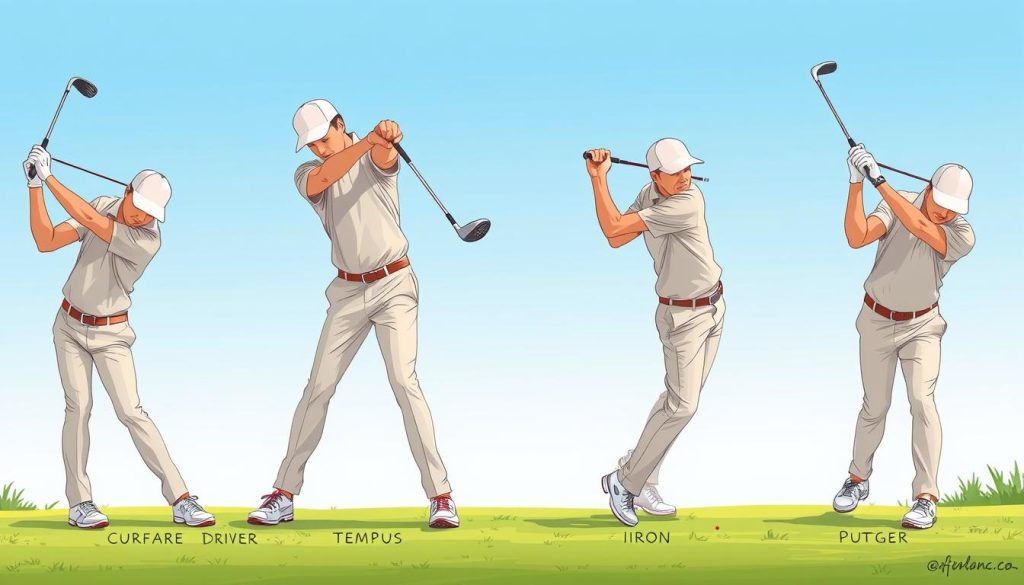Golf swing tempo is the heart of your game. It’s what makes pros stand out from amateurs. Your swing rhythm can greatly affect your performance. This guide will help you master your swing tempo for better shots.
A great golf swing has rhythm. A smooth swing improves your accuracy and distance. Many golfers focus on technique but forget about tempo. Learning consistent tempo golf will boost your game.
Swing rhythm drills are key for muscle memory and timing. They help you get the right tempo naturally. With practice, your swing will become smoother and more powerful.
Key Takeaways
- Golf swing tempo is crucial for consistent performance
- The 3:1 ratio of backswing to downswing is considered optimal
- Proper tempo leads to improved accuracy, power, and consistency
- Swing rhythm drills help develop muscle memory
- Consistent tempo golf can significantly elevate an amateur’s game
Understanding the Fundamentals of Golf Swing Tempo
Golf swing tempo is key but often ignored. It’s the rhythm that affects your swing’s power and accuracy. Let’s explore the swing tempo’s components and why it’s vital for your game.
What Defines Swing Tempo
Swing tempo is the consistent rhythm of your golf swing. It’s not about speed, but a smooth motion for reliable results. Top golfers like Tiger Woods and Jack Nicklaus have a 3:1 swing ratio, showing the swing’s timing is crucial.
The Difference Between Tempo and Timing
Tempo and timing are different in golf. Tempo is the swing’s rhythm, while timing is the exact sequence of movements. Mastering both is essential for good swing cadence training.
Why Proper Tempo Matters
A consistent tempo means more power at impact, less tension, and more predictable results. Dr. Bob Grober’s study found pros have a 3:1 tempo ratio, while amateurs vary more. This consistency is what sets pros apart from amateurs.
- Improves consistency in shot-making
- Enhances power and distance
- Reduces the risk of slicing or hooking
- Promotes better balance throughout the swing
Understanding and practicing proper swing tempo can greatly improve your game. As you work on your swing cadence, remember consistency is crucial for the ideal timing.
The Science Behind the 3:1 Ratio in Golf Swing
Developing rhythm in your golf swing is key to playing well. The 3:1 ratio is a big idea in keeping your swing tempo right. It means your backswing should last three times longer than your downswing.
Breaking Down the Perfect Tempo Ratio
The Tour Tempo app says the 3:1 ratio is best for golf swings. Golfers often start with a 3.5:1 ratio and aim for the 3:1. This ratio works for all swing speeds, helping you hit the ball harder and more consistently.
Professional Players’ Tempo Analysis
Research shows top golfers usually swing at a 3:1 ratio. But, they often swing a bit faster than this. Knowing this can help you improve your swing rhythm.
Biomechanical Aspects of Swing Rhythm
Your golf swing starts with your feet. Many beginners start their downswing with their arms. To get better, load your glutes first and keep your arms and shoulders loose. This helps your muscles work right and improves your swing rhythm.
| Swing Phase | Duration Ratio | Key Focus |
|---|---|---|
| Backswing | 3 | Proper loading, relaxed upper body |
| Downswing | 1 | Ground-up initiation, weight shift |
Mastering Your Golf Swing Rhythm Guide
Mastering swing cadence is key for golfers wanting to get better. This guide will help you find your swing’s rhythm and make your shots more consistent.
Begin with the 3:1 ratio, a vital part of swing rhythm. This means your backswing should last three times longer than your downswing. Practice with different clubs to make it a habit.
Lowering grip tension helps your swing flow better. A relaxed grip means better club control and smoother moves. Also, about 70% of golfers see improvement with custom-fitted clubs, which ensure the right grip size.
Visualization is important for mastering your swing rhythm. Use mental rehearsal to practice the right tempo. Picture a smooth swing before each shot to get your body ready.
| Swing Component | Impact on Performance | Recommended Focus |
|---|---|---|
| Grip | 60% favor neutral grip | Accuracy and trajectory |
| Posture | 90% of successful swings | Alignment and setup |
| Backswing | 75% of swing success | Steady rotation and balance |
| Transition | 85% rhythm maintenance | Smooth backswing to downswing |
Regular practice with tempo-focused drills is crucial. Use tools like alignment sticks or the “Lag Shot” to improve your swing. They give you instant feedback on your rhythm.
Common Tempo Issues and Their Solutions
Golf swing tempo problems affect many players, impacting their game. Let’s look at common rhythm issues and how to solve them.
Identifying Rhythm Problems
Many golfers have trouble keeping a steady tempo. Signs include rushing the downswing, uneven backswing lengths, and tempo changes with different clubs. These problems can cause unpredictable shots and higher scores.
Corrective Techniques
To solve tempo issues, try these exercises:
- Use counting drills to keep a 3:1 ratio from backswing to downswing
- Practice with a metronome for a consistent rhythm
- Use swing analysis tech to track your tempo
- Work on a smooth transition from backswing to downswing
Prevention Strategies
To avoid tempo problems, add these habits to your routine:
- Do regular tempo-focused practice
- Keep your arms and shoulders relaxed during the swing
- Have a consistent pre-shot routine to set your rhythm
- Watch your grip pressure, keeping it light
| Common Tempo Issue | Cause | Solution |
|---|---|---|
| Rushing the downswing | Anxiety or overexcitement | Practice the 3:1 tempo ratio |
| Inconsistent backswing | Lack of body awareness | Use alignment sticks for feedback |
| Varying tempo between clubs | Overthinking club differences | Focus on consistent rhythm across all clubs |
By tackling these common tempo issues and practicing rhythm exercises, you can improve your golf swing.
Essential Drills for Developing Consistent Tempo
Mastering a consistent golf swing tempo is crucial for improving your game. Let’s explore some effective swing rhythm drills and golf tempo exercises. These can help you achieve a smooth, powerful swing.
The ideal tempo for a full swing follows a 3:1 ratio, while short game shots benefit from a 2:1 ratio. To develop this rhythm across different clubs, try the Three Driver Three Wedge Drill. This exercise helps you maintain a steady tempo regardless of club length.
Core-Focused Drills
The One Two Core Drill emphasizes the importance of engaging larger muscles for better control. Count to two on your backswing to improve timing. This drill helps you develop a smooth transition and consistent rhythm throughout your swing.
Rhythm and Feel Exercises
Try swinging with your eyes closed to enhance your feel for the swing’s rhythm. This technique can significantly improve your tempo consistency. Another useful drill is the Feet Together Drill, which helps refine your balance and promotes a smoother swing motion.
Using Technology
Incorporate a metronome into your practice routine. Start at 60 beats per minute and adjust in 5-beat increments to find your ideal rhythm. The HackMotion Pro wrist sensor can also measure your swing tempo, providing valuable feedback for improvement.
| Drill Name | Purpose | Key Focus |
|---|---|---|
| Three Driver Three Wedge | Consistent tempo across clubs | Maintaining 3:1 ratio |
| One Two Core | Improve timing and tempo | Engaging larger muscles |
| Load Then Swoosh | Enhance weight transfer | Smooth transition |
| Feet Together | Refine balance | Promoting smooth motion |
| Right Left Tempo | Improve overall rhythm | Coordinating body movements |
Remember, consistency is key. Incorporate these golf tempo exercises into your practice sessions multiple times a week. This will lead to noticeable improvements in your swing consistency and overall performance.
The Role of Mental Game in Swing Rhythm
Golf is as much a mental game as it is physical. The mental game in golf is key to a consistent swing rhythm. By mastering your mind, you can unlock your full potential on the course.
Visualization Techniques
Golf swing visualization is a powerful tool to improve your performance. Imagine yourself executing the perfect swing, feeling the rhythm and tempo. This mental rehearsal helps make the correct movements part of your muscle memory. Picture the ball soaring effortlessly through the air, landing exactly where you intended it. By combining this visualization practice with a reliable golf swing tips video, you can better understand the mechanics and turn your mental practice into physical excellence. Over time, this blend of mental imagery and practical advice can significantly enhance your consistency and confidence on the course.

Maintaining Focus
Staying focused during your swing prevents rushing or hesitation. Try the Breath Watching technique to clear your mind. Focus on your breathing, taking 3-5 deep breaths per minute through your nose. This practice induces calm and clarity, allowing you to eliminate distractions and play each shot in the moment.
Pre-shot Routine Development
A consistent pre-shot routine is key to establishing a rhythmic pattern. Develop a routine that includes examining conditions, gathering thoughts, and locking in on the shot. Use positive self-talk or mantras to boost confidence before swinging.
| Mental Game Element | Benefit | Technique |
|---|---|---|
| Visualization | Improves muscle memory | Mental rehearsal of perfect swing |
| Focus | Reduces distractions | Breath Watching exercise |
| Pre-shot Routine | Establishes rhythm | Consistent preparation steps |
| Positive Self-talk | Boosts confidence | Affirmations and mantras |
By incorporating these mental game strategies, you can enhance your swing rhythm and overall performance on the golf course.
Technology and Tools for Measuring Swing Tempo
Golf swing analysis technology has advanced a lot. Now, golfers can use advanced tools to improve their game. These tools give precise data on your swing, helping you fine-tune your rhythm and consistency.
The DeWiz Training Aid is a favorite among pros like Bryson DeChambeau and Annika Sorenstam. It provides detailed insights into your swing times. This helps you achieve the perfect tempo ratio.
The Voice Caddie T9 Golf GPS Watch is great for those who like wearable tech. It has a Tempo Trainer to keep your rhythm steady. The Apple Watch Series 8 and Ultra also have golf apps that analyze your swing with motion sensors.
The BioMech Putt Sensor is perfect for improving your putting. It analyzes your stroke and scores each putt out of 100. For indoor practice, the ExPutt RG Putting Simulator gives detailed feedback on your stroke.
Using these tools with professional instruction can greatly improve your game. By refining your swing rhythm, you’ll see lower scores and more fun rounds.
Adapting Tempo for Different Club Types
Golf swing rhythm changes are key to mastering your game. Each club needs a special tempo for the best results. Let’s look at how to adjust your swing for different clubs.
Driver Tempo Specifics
Drivers need a slightly slower backswing for control. Aim for a smooth, powerful swing. Use a 3:1 tempo, with three counts for the backswing and one for the downswing. This rhythm helps you hit the ball farther.
Iron Play Rhythm
Irons need a steady, smooth tempo. Stick to the 3:1 ratio but with a shorter swing. Keep your backswing controlled for accurate shots. Practice this to get better with irons.
Short Game Tempo Adjustments
Short game shots need a different tempo. For pitching and chipping, use a 2:1 ratio. This quick tempo helps with control and accuracy near the green. Putting uses a 2:1 backswing to stroke ratio for a smooth motion.

| Club Type | Tempo Ratio | Key Focus |
|---|---|---|
| Driver | 3:1 | Smooth power |
| Irons | 3:1 | Steady control |
| Short Game | 2:1 | Quick precision |
| Putting | 2:1 | Pendulum motion |
Practicing these specific tempos makes your swing more versatile. Remember, being consistent is crucial. Regular practice will help you switch between clubs smoothly, enhancing your game.
Building Power Through Proper Rhythm
Unlocking power in your golf swing starts with mastering rhythm and distance. Proper tempo isn’t just about timing; it’s the key to unleashing explosive energy. By focusing on a smooth, consistent rhythm, you’ll transfer energy more efficiently.
The secret lies in the 3:1 ratio, a proven technique used by pros. This ratio helps create a proper coil in your backswing, storing energy like a compressed spring. As you transition to the downswing, this stored power is released, resulting in greater clubhead speed and distance.
To develop this power-generating rhythm, start with exaggerated movements to establish the feeling. Focus on relaxed, supple body movements and pay attention to the pressure shift in your feet. This shift, similar to pressing a gas pedal, is crucial for creating the rhythm that drives your swing.
Practice drills like the compression drill can help you maintain this rhythm, even under pressure on the course. As you perfect your tempo, you’ll find that focusing on smooth, rhythmic swings rather than trying to swing harder will consistently lead to increased distance and improved overall performance.
FAQ
What is the ideal tempo ratio for a golf swing?
How does proper tempo improve my golf game?
What’s the difference between tempo and timing in a golf swing?
Are there any effective drills to improve swing tempo?
How can I use technology to measure and improve my swing tempo?
Does the 3:1 tempo ratio apply to all types of golf shots?
How does swing rhythm affect power in golf?
What role does the mental game play in maintaining good swing rhythm?
What are common tempo issues and how can I address them?
How can I adapt my tempo for different club types?
Source Links
- https://mramusicplace.net/2016/07/01/rhythm-all-around/
- https://rotaryswing.com/golf-instruction/swingfundamentals/golf-swing-rhythm
- https://skillest.com/blog/a-comprehensive-guide-to-mastering-the-golf-swing/
- https://practical-golf.com/swing-tempo
- https://nationalgcla.com/the-basics-of-the-golf-swing/
- https://www.swingtuneup.com/post/golf-swing-tempo
- https://forum.practical-golf.com/t/tempo-work-how-to-practice/1364
- https://rotaryswing.com/c4/112080-how-to-swing-from-the-ground-up-golf-swing-transition
- https://dewizgolf.com/blogs/learning-center/practice-and-learn-modes?srsltid=AfmBOoo13lfR57UwbSzCF_v2DJwGXyHz3ptvZ8UpYgyJCyRukU5sLGyd
- https://lilyfieldphysio.com.au/blog/uncategorized/mastering-golf-swing-step-by-step-guide/
- https://hackmotion.com/common-golf-swing-mistakes/
- https://thegratefulgolfer.com/2023/03/12/timing-and-tempo-of-a-golf-swing/
- https://hackmotion.com/golf-swing-tempo/
- https://nationalgcla.com/tempo-training-the-metronome-drill/
- https://hackmotion.com/best-golf-swing-tempo-drills/
- https://rotaryswing.com/golf-instruction/mentalgolfgame/mental-golf-game-introduction
- https://golf.com/instruction/9-ways-improve-golf-mental-game-jon-sherman/
- https://golfstateofmind.com/self-talk-in-golf/
- https://www.golfmonthly.com/buying-advice/best-golf-swing-analyzers-year
- https://skillest.com/blog/the-ultimate-guide-to-master-your-golf-swing-with-the-apple-watch/
- https://www.trackman.com/blog/golf/the-ultimate-guide-to-understanding-trackman
- https://theleftrough.com/golf-swing-tempo/
- https://orangewhipgolf.com/blog/why-is-tempo-so-important-in-a-golf-swing/?srsltid=AfmBOopnZpBwQTzz1Lb4BsqPK3q7bTCrw2wq5QE6glfxIIEtJ5OJFMxr
- https://rotaryswing.com/c4/112410-axiom-golf-discover-your-natural-rhythm-tempo
- https://www.rvcc.com/blog/mastering-your-golf-swing
- https://skillest.com/blog/mastering-the-follow-through-in-your-golf-swing/


